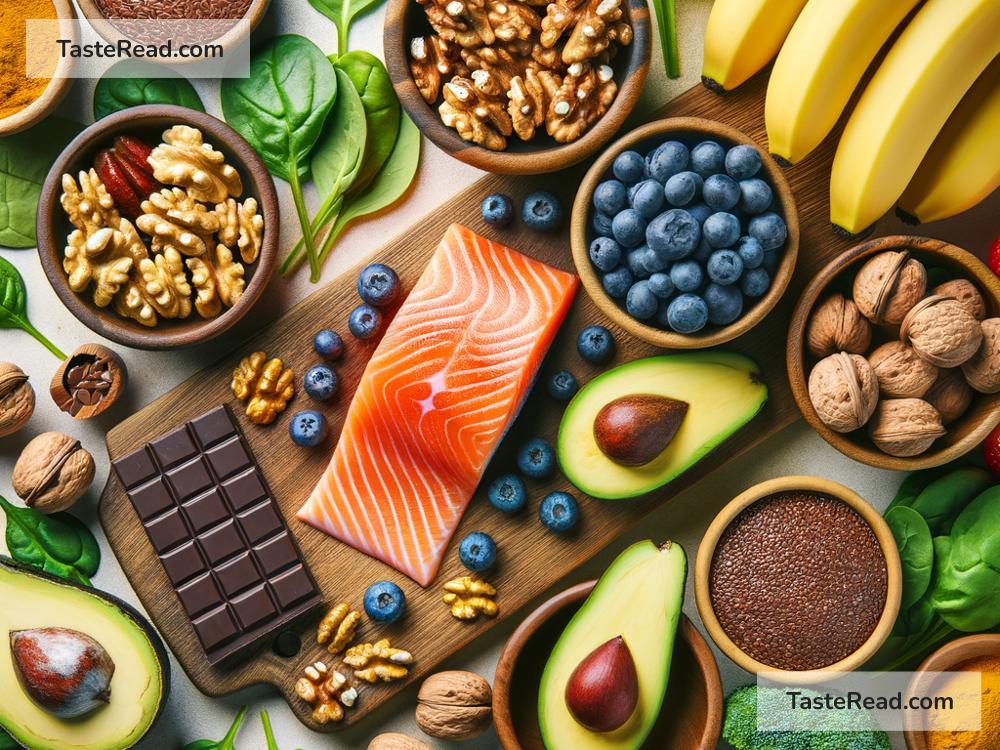Foods for Reducing Neurotransmitter Imbalances: A Simple Guide
Neurotransmitters are chemical messengers in your brain that play an important role in how you feel, think, and act. They are responsible for regulating mood, sleep, focus, and even your overall sense of well-being. But when the balance of neurotransmitters gets disrupted, it can lead to problems like anxiety, depression, poor concentration, fatigue, and more. Sometimes, this imbalance happens due to stress, lack of sleep, genetics, or poor diet. The good news is that certain foods can help support healthy neurotransmitter function and bring your brain back into balance. Let’s take a closer look at how this works.
What Are Neurotransmitters?
There are many types of neurotransmitters, but the most common ones include:
– Serotonin: Known as the “happy hormone,” serotonin is responsible for regulating mood, sleep, and appetite.
– Dopamine: This neurotransmitter plays a role in motivation, pleasure, and focus.
– GABA (Gamma-Aminobutyric Acid): GABA is your brain’s “calm-down” chemical. It helps reduce stress and anxiety.
– Acetylcholine: This neurotransmitter is key for memory and learning.
– Norepinephrine: Often called the “fight-or-flight” chemical, norepinephrine helps you stay alert and respond to stress.
When these neurotransmitters are not balanced, it can affect your physical and mental health. But eating the right foods can give your brain the nutrients it needs to support production and regulation of neurotransmitters.
Foods That Support Neurotransmitter Balance
Certain foods contain nutrients that act as building blocks for neurotransmitters or help restore balance in your brain. Here are the best types of foods to eat for promoting healthy neurotransmitter function:
1. Foods Rich in Protein
Protein contains amino acids, which are essential for creating neurotransmitters. For example:
– Tryptophan: Found in turkey, chicken, eggs, dairy, nuts, and seeds, tryptophan is used to produce serotonin.
– Tyrosine: Found in lean meats, fish, dairy, and beans, tyrosine is used to make dopamine and norepinephrine.
Adding protein to your diet ensures your brain has the raw materials it needs to make these important messengers.
2. Leafy Greens and Vegetables
Dark leafy greens like spinach, kale, and Swiss chard are rich in magnesium and folate. Here’s why these nutrients matter:
– Magnesium: Helps reduce stress and supports GABA production, calming your brain.
– Folate: Known as vitamin B9, folate is crucial for producing serotonin and dopamine.
Other vegetables like broccoli, Brussels sprouts, and asparagus also provide antioxidants that protect your brain from oxidative stress, keeping neurotransmitters balanced.
3. Healthy Fats
Your brain needs healthy fats to function properly. Omega-3 fatty acids, in particular, are essential for regulating serotonin and dopamine. Foods rich in healthy fats include:
– Fatty fish (like salmon, sardines, and mackerel)
– Walnuts
– Flaxseeds
– Avocados
These fats help maintain flexible cell membranes in the brain, allowing better communication between your neurons.
4. Whole Grains
Whole grains like oats, quinoa, brown rice, and whole wheat contain complex carbohydrates. These carbs increase the availability of tryptophan in the brain, which is then converted into serotonin. Whole grains also help stabilize blood sugar levels, giving your brain steady energy instead of mood swings.
5. Fermented Foods
Fermented foods such as yogurt, kefir, kimchi, and sauerkraut are rich in probiotics, which support gut health. Why is gut health important for neurotransmitter balance? The gut is often called the “second brain” because it produces and houses many neurotransmitters, including serotonin. A healthy gut leads to better communication between your gut-brain axis, promoting overall balance.
6. Nuts and Seeds
Nuts and seeds, such as almonds, walnuts, sunflower seeds, and pumpkin seeds, are packed with nutrients like magnesium, zinc, and vitamin B6. These nutrients play key roles in neurotransmitter production. For example:
– Vitamin B6: Helps convert tryptophan into serotonin.
– Zinc: Supports dopamine production.
Snacking on nuts and seeds is an easy way to give your brain a boost throughout the day.
7. Berries
Berries such as blueberries, strawberries, and raspberries are rich in antioxidants, which protect the brain from damage caused by stress and inflammation. By reducing oxidative stress, berries help neurotransmitters work efficiently.
8. Eggs
Eggs are a great source of choline, a nutrient that your brain uses to create acetylcholine, the neurotransmitter involved in memory and learning. The yolk also contains vitamin D, which supports serotonin production.
A Balanced Diet Matters
Eating these brain-healthy foods regularly can help restore neurotransmitter balance, but it’s just one piece of the puzzle. Keep these tips in mind for better results:
– Stay hydrated: Drinking enough water supports overall brain function.
– Limit processed foods: Junk food can disrupt neurotransmitter balance.
– Avoid caffeine and alcohol (in excess): These can throw off your neurotransmitters and make imbalances worse.
– Exercise: Physical activity helps boost dopamine and serotonin naturally.
Final Thoughts
Neurotransmitter imbalances can affect your mood, focus, and energy levels—but you don’t have to live with them. By eating foods that support your brain, such as proteins, leafy greens, healthy fats, and fermented foods, you can give your body the tools it needs to restore balance. Remember, a happy brain is a healthy brain, and simple changes in your diet can make a big difference over time. Make these foods part of your daily routine, and enjoy the benefits of a calmer, brighter, and more balanced mental state!


